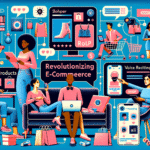As we approach 2025, the landscape of marketing is evolving rapidly, driven by technological advancements and changes in consumer behavior. Artificial Intelligence (AI) stands at the forefront of this transformation, offering innovative solutions for businesses to enhance their marketing strategies. This article explores the key strategies for harnessing AI in marketing, ensuring success and relevance in 2025.
The Role of AI in Modern Marketing
AI technologies encompass machine learning, natural language processing, and data analytics—tools that can significantly enhance marketing practices. In contemporary marketing, AI serves several crucial functions:
- Personalization – AI enables businesses to deliver tailor-made content and experiences to customers by analyzing vast amounts of data.
- Predictive Analytics – AI algorithms can predict customer behavior, enabling proactivity in marketing strategies.
- Automation – Routine tasks such as email marketing, social media posts, and customer responses can be automated, freeing marketing teams to focus on strategy and creativity.
- Data Analysis – AI significantly accelerates data analysis, providing marketers with actionable insights in real time.
Understanding Consumer Behavior with AI
Advanced Consumer Insights
AI tools analyze consumer data from multiple sources—social media interactions, website behavior, and purchase history—to form a comprehensive picture of customer preferences. By understanding these patterns, marketers can create targeted campaigns that resonate with specific audiences.
Sentiment Analysis
Leveraging AI for sentiment analysis allows marketers to gauge public opinion on their brand or products. By analyzing social media posts, reviews, and even customer service interactions, businesses can understand consumer sentiment and adjust their strategies accordingly.
Enhancing Customer Experience
Chatbots and Virtual Assistants
Artificial intelligence has revolutionized customer service through the deployment of chatbots and virtual assistants. These tools provide instant support, answer consumer queries, and guide them through the purchasing process, significantly improving the overall customer experience.
Predictive Customer Journeys
AI can map out customer journeys by predicting future behaviors based on past interactions. This foresight enables marketers to intervene at strategic points, enhancing engagement and conversion rates.
Creating Content with AI
Automated Content Generation
AI can assist in generating content—including blogs, social media posts, and product descriptions—through natural language processing (NLP). Automated tools can produce SEO-optimized content, allowing marketers to maintain a consistent online presence.
Innovating Creative Processes
AI isn’t only about efficient content generation; it aids creativity by analyzing successful past campaigns and inspiring new ideas. Tools that analyze trends can suggest innovative approaches, improving brainstorming sessions and creative outputs.
Optimizing Marketing Campaigns
A/B Testing and Optimization
AI can streamline testing processes by automating A/B tests and analyzing results in real time. Marketers can quickly identify which versions of their campaigns yield better results and optimize accordingly.
Real-Time Analytics
Utilizing AI for real-time analytics enables marketers to continuously monitor campaign performance and make adjustments on the fly. This agility is essential in today’s fast-paced market, allowing brands to respond quickly to trends and consumer feedback.
Building an Integrated Marketing Ecosystem
Cross-Channel Marketing
AI enables seamless integration across multiple marketing channels by analyzing data from different platforms. This holistic view allows marketers to maintain uniform messaging and customer experience across email, social media, and paid advertising.
CRM Integration
By integrating AI with Customer Relationship Management (CRM) systems, marketers can gain deeper insights into customer interactions and preferences, allowing for more personalized and effective marketing strategies.
Ethical Considerations and Data Privacy
Respecting Consumer Privacy
As AI becomes increasingly integral to marketing strategies, businesses must prioritize consumer data privacy. Adhering to regulations such as GDPR and CCPA is essential to build trust and maintain customer loyalty.
Promoting Transparency
Marketers should communicate how AI is used in their strategies and how customer data is managed. Transparency can foster trust, making consumers more likely to engage with brands.
Embracing Continuous Learning and Adaptation
Staying Updated on AI Trends
The AI landscape is continuously evolving. Marketers must stay informed about the latest developments and tools to remain competitive. This entails attending industry conferences, participating in workshops, and enrolling in relevant training programs.
Fostering a Culture of Innovation
By encouraging experimentation and innovation within their teams, businesses can leverage AI to discover new marketing tactics that align with future trends. This proactive approach will position companies for continued success in a dynamic market.
Conclusion
As we move towards 2025, leveraging AI in marketing will be imperative for organizations aiming for growth and sustainability. By strategically implementing AI across various facets of marketing—from understanding consumer behavior to optimizing campaigns—businesses can create personalized, efficient, and impactful marketing strategies. Adapting to this technological evolution will not only enhance marketing efforts but also foster meaningful connections with consumers in an increasingly competitive environment.
[ad_2]As the marketing world evolves with AI, expanding your knowledge on related topics can be advantageous. For those curious about the underlying technology, you might be interested in exploring [Machine Learning](https://en.wikipedia.org/wiki/Machine_learning) and how it powers data-driven decisions. Additionally, the concept of [Natural Language Processing](https://en.wikipedia.org/wiki/Natural_language_processing) provides fascinating insights into how AI comprehends and generates human language. To understand the innovation behind customer interactions, delve into [Marketing Automation](https://en.wikipedia.org/wiki/Marketing_automation) and its impact on efficiency. Each of these areas plays a significant role in transforming modern marketing strategies, ensuring that businesses stay ahead in an increasingly competitive environment. — Feel free to change the presentation style as per your preference!





